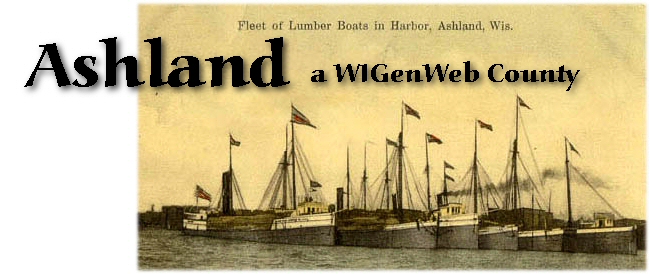
 |
|
The Milwaukee Journal - February 8, 1931 This is the final installment of his boyhood told by William H. Wheeler, retired businessman of Beloit, whose youth was spent among the Chippewa Indians of Northern Wisconsin, where his parents were missionaries. Mr. Wheeler in previous installments has told of the arrival of his parents at La Pointe, and of his boyhood, which differed but little from that of the Indian youths with whom he played. "While we lived at Madeline Island and Odanah a good many prominent Americans came to visit especially at the time of the Indian payments. The first payment at Odanah was in 1855." "Once a young professor who was a Yale graduate came to take some part in the payment. He was Professor Joseph Emerson, who taught Greek at Beloit. He urged father to send us there to enter the Beloit academy." "In April 1864, when I was just turned 17, President Lincoln sent out a call for 100-day troops to take over the military duties in southern cities so that the seasoned troops might be released to take part in Grant's campaign." "I enlisted in the 40th Wisconsin, a regiment composed of college boys, and Bishop Samuel D. Fallows was our Lieutenant Colonel. Senator John C. Spooner was a private. We were sent to Memphis where we took over one half of the picket line, the other half being held by the 39th Wisconsin a similar regiment. I came out of the army in October 1864." "Our Beloit contingent of 60 travelers from Madison to Beloit, crowded the caboose of an accommodation train. I was happy at the thought of getting back home. Not many days now and I would be in the pine-scented woods of Odanah. Mother and father and the children would be there." "It was stuffy in the caboose, so some of us went out on the platform. We were laughing and joking, a bunch of boys glad to be through with war." "There is a heavy downgrade between Clinton and Beloit and as we came through a rock gorge, a cinder from a shower of wood sparks hit me squarely in my good eye. The other had not been of much use since it had been straightened as a child. This one bad eye had something to do with getting me the name 'Bastian.' It appeared that some Frenchman called Bastian who was quite a character around Lake Superior, owned a bad eye." "The pain in the eye which the wood spark struck was intense. I found myself blind." "In Beloit I had medical attention and waited around until I could manage to make my way home to Odanah." "Such a trip that was! I first went to Green Bay over the Northern Railroad. There I boarded a boat to Escanaba. Then came a trip by rail 65 miles across the Upper Peninsula to a point 13 miles this side of Marquette, Michigan, as far as the railroad had been completed. A stage took me to Marquette." "There I boarded one of Mark Hanna's boats that landed me at Ontonagon. Then came a voyage on a sailing vessel, brining me to Bayfield, where I climbed into a bateau with Baptiste DeNumone, one of my old French Canadian friends. Now, I was getting home." "We camped that night at the mouth of the Bad River. I slept in my army blankets. The next morning we hat to break our way through the ice. When we came to a familiar trail leading off through the woods, I told Baptiste to put me off." "With my pack on my back I arrived at the Indian school to be greeted as one from the dead. I had been gone from home more than a year." "In 1866 father moved to Beloit and the windmill that had contrived for the Indians back at Odanah, now named the Eclipse, supported us. Father died in 1872. In 1893 the Fairbanks-Morse people bought our rights and business." "I have done a good many things since. After the sale of the Eclipse, we organized 'W.H. Wheeler & Company, a firm of consulting and construction engineers, which built many water systems and promoted municipal ownership of many public utilities. Through our efforts a number of industries were located in Beloit and elsewhere. An illustration of the effects of our efforts is the manufacturing suburb of South Beloit, Illinois. A cornfield in 1902, it is now a city of 2,300 with 16 active industries, all up to date civic improvements and advantages." "But the years devoted to business do not stand out as do the early ones spent on the reservation. Each season brings up special memories of the woods." "Soon now I am sure that the young Chippewas will be making the flutes - it is the young man in love who fashions a flute." "He takes a number of small cedar staves and fastens them together with sturgeon glue. He cuts openings and makes a small reed… the flute is finished. Its voice shall tell the girl of his dreams, the story of his love. He steals close to her lodge, puts the flute to his lips and its voice tells of love and spring, of mating birds, and of the soft winds that will come soon bringing little flowers under the pine trees." "From the forest comes her answer in a minor key." Chemahweeyan. Morning. "It is three quarters of a century since I have heard the Ojibway love song on an Indian flute in earliest spring." "White musicians try to play it, but they miss the poignant transportation from major to minor that has in it the bittersweet of life, the tenderness and the cruelty." "I married a Beloit girl, the daughter of Professor S. Lathrop, first head of the Chemistry Department of Beloit College. We have always made our home in Beloit." |
|
|
Last Update Monday, 07-May-2018 17:23:36 CDT
 |
WIGenWeb State Coordinator:
Tina Vickery WIGenWeb Assistante State Coordinator: Marcia Ann Kuehl Copyright 2010 by the WIGenWeb Team. All rights reserved. Copyright of submitted items belongs to those responsible for their authorship or creation unless otherwise assigned. |
 |